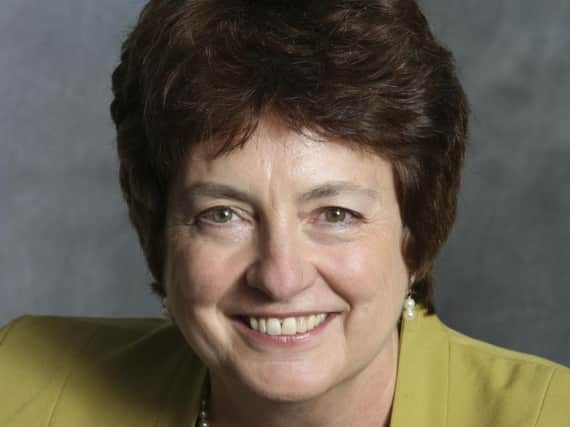Credibility of National 4 qualifications a 'huge challenge'


Dr Janet Brown of the Scottish Qualifications Authority admitted there was a problem with the perception of the National 4 qualification which is gained through continuous assessment rather than an examination.
Quizzed by the Scottish Parliament's education committee - which is investigating whether teenagers have a wide enough choice of subjects - the SQA chief executive said the National 4 had a "huge challenge with regard to credibility".
Advertisement
Hide AdAdvertisement
Hide AdMuch of the problem lay with teachers she said, while young people were far more accepting of the internal assessment and value of a National 4.
The National 4 and National 5 qualifications replaced Standard Grades during the 2013-14 school year, with the former becoming the equivalent of a General pass.
The value of the qualification was raised by Scottish Labour's education spokesperson Iain Gray, who said the committee had received "a number of submissions which have said categorically that the National 4 is considered worthless."
Dr Brown said: "We have just done a credibility survey, run by an external organisation where they met people on the street and they made telephone calls randomly, and we've got data which shows that for National 4, for young people and mature candidates, the percentage who felt there was a low credibility for National 4 was around 18 per cent, and the highest level of low credibility was among teachers at 37 per cent, employers was 15 per cent.
"I think we need to address the credibility of National 4 - it is a very valuable qualification. Yes there's no external exam but there are no external exams in Higher National certificates or Higher National diplomas. It's about perception."
She added: "It's also about ensuring those learners who have achieved certification at National 4 have actually achieved the learning and knowledge and skills demonstrated in National 4. It was designed specifically for those students going on to courses that do not have examinations, so there's a huge challenge with regard to credibility of National 4 but we really need to address that."
Dr Brown and her colleagues Dr Gill Stewart, Director of Qualifications, and James Morgan, Head of Research, Policy Standards and Statistics with the SQA, were also challenged on the decision to "downgrade" the National 4 to a qualification with no examination.
Scottish Labour's Johann Lamont asked: "In the past kids at [Standard Grade] General, not Foundation, would have an exam establishing a level of attainment, now under National 4 they are not assessed externally and it's now a pass or fail. Do you accept that is a form of downgrading, of reducing the amount of time and attention that the system gives to those particular young people?"
Advertisement
Hide AdAdvertisement
Hide AdDr Stewart said that the original design of the National 4 - and National 3 - qualifications had been developed through a public consultation and overseen by the Curriculum for Excellence management board, where it was agreed they "would be internally assessed was because young people at that level often don't do particularly well with external exams."
She added: "At an insider level within the SQA, looking at how young people performed with external exams you could clearly see that. The rationale was from an equity point of view and that it was more appropriate for those young people to have their qualifications internally assessed."
She said that SQA focus groups had found that while young people did not see internal assessment as a an issue, there was a "more mixed view from teachers and managers in schools."
The Committee were also told that the success of Curriculum for Excellence should be judged by the "outcome of the senior phase" - when a child has turned 18 - rather than on concerns about subject choice in fourth year.
Scottish Conservative education spokesperson Liz Smith said: "The subject choice issue is a major concern. Especially if you look at the statistics about the considerable drop off in the numbers taking modern languages - particularly German and French - and some of the STEM (science, technology, English and maths) subjects.
"The real issue for a lot of parents is that while the broad general education [in first to third years] may have given them general width and breadth than was possible before with some new subjects when it comes to the core curriculum there is a problem about the subject choice."
Dr Brown replied: "It is a question of thinking about the outcome of all of education, not just S4. It's about the outcome of the senior phase and is that a better point for children these days than it used to be in the old system?"
And on languages Dr Brown added: "The major drop off in languages probably occurred when they were no longer compulsory. We've seen a fall off in languages and we are fiercely proud of the fact that we have got some really good language qualifications that we really want students to be learning.
Advertisement
Hide AdAdvertisement
Hide Ad"What we are seeing is continued strength in the Higher so it's the National 4 and 5 subjects that have declined but people who really want to do languages continue to do the Higher."
Dr Gill Stewart, added: "The whole kind of ethos and philosophy of CfE was about a three-year senior phase building on the broad general education. Some of the criticisms of the previous qualifications was the so-called two-term dash to higher and trying to fit higher into a very short time period.
"One of the things Curriculum for Excellence was trying to address was the depth of learning and giving young people more opportunity for depth of learning."